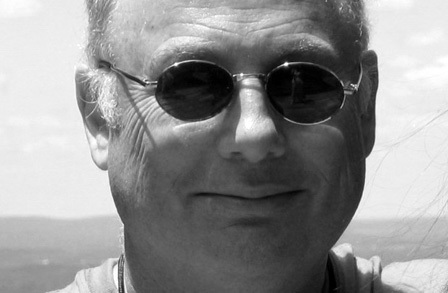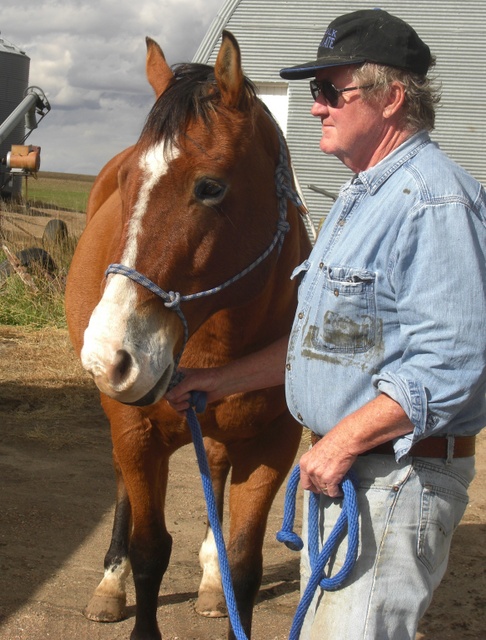 Dave Smith via The Poetry Foundation
Dave Smith via The Poetry Foundation
/
By design I was to introduce the poet Dave Smith on December 4th, 2013 at Rockhurst University in Kansas City, Missouri. By chance an ice storm struck Mississippi where Dave lived and he could not make it. By design he returned to give his reading at Rockhurst in September; by chance I could not be there. Those of us who write as much for pleasure as for profit try not to waste words; better to recycle them, to wit:
Dave Smith and I have been friends for almost thirty years which might surprise him because we met only four or five years ago and since then have passed only a few hours in each others’ company.
We did not grow up together; his brother did not date my sister, and we did not get in a fight about it; we did not hunt quail together with me out-shooting him (or the other way around) neither of us boasting of it but instead agreeing it was good practice to feed the quail heads to the dogs. We did not swap lies at the local tavern, nor tell raw jokes back and forth, the same ones again and again over the years, my favorite being about the Ozark man who feeds his pigs apples and Dave’s being an especially reprehensible one about a hillbilly bringing his daughter to the doctor for birth control pills.
And we have not grown old together, the two of us at a high school reunion a few years ago in either his Virgil Cain’s south or my West Jesus Land, Kansas, re-calling that in our youth we’d talk about breasts and buttocks but now we talk about stove-up bowels and government bonds. How is it then have we been friends all these years? By the power of the 17century metaphysical poet’s ability to yoke the mechanics of compasses with the sublimity of love I will explain.
Not that Dave would know this, but I first met him when he was in Utah and I was in Paris. A left bank book store (not Shakespeare and Company) had a display of American literary magazines, and I bought two or three to take back to my apartment in the couscous quarter. In those literary magazines I read a number of poets whose work I knew (and knew in person as well as in print) and some I did not: Dave Smith was among the latter in both regards. But instead of being just a poet whose poetry I had not read, he became a poet who sent his poems directly (and especially) to me via a literary cosmic connection established well before the Internet.
Surely all of us who read have had such an experience: Bill Stafford wired me poetry from the early sixties on—well before we met. William Maxwell and J.D. Salinger hailed me from New York City. Evan S. Connell sent me high signs from New Mexico years before Paul Newman and Joanne Woodward became Mr. and Mrs. Bridge. Henry Green (not Graham Green) found me sitting on a bench in Washington Square’s Greenwich Village, Mary Travis a bench away. Paul Bowels got in touch from Tangiers while I was in California at the No Name bar in Sausalito listening to Tom Leher sing Poisoning Pigeons in the Park on the jukebox. As Dave Smith writes of the poet Richard Hugo: “His poems spoke to a listener that I did not know was in me; an ear I didn’t yet know listened.”
Remember when Holden Caulfield says that when he reads a good book he wants to call the author. That’s what it is like. Only in reverse: Dave Smith called me in Paris and we began over the years a magical literary conversation. Not that Dave Smith knew (or maybe he did and just never told me). Which reminds me: Garcia Marquez got in touch from Macondo; Elizabeth Bishop from the New Yorker; Amos Tutuola from Nigeria; Elizabeth Bowen from Dublin; Jean Rhys and Mavis Gallant from Paris; and in Kansas City at the Westport Inn where I was sitting at a back table having a red beer, Andrei Bely hailed me from Petersburg at the suggestion of Vladimir Nabokov who, in the early sixties, had sent Dolores Haze in her circular skirt and scanties to my night stand at the Window Dunn’s farm house in Lawrence, Kansas.
The list is long; the world is round, the conversation everlasting. To talk about literature is as natural as breathing, Eliot writes. Dave Smith spoke to me; I listened. Our breathing had begun.
The Dave Smith I met on rue Xavier Prive in Paris that summer wrote thin, long one stanza poems; more elegy than story. Others were short and taciturn. Not quite lyrics, they were less songs than small bore single shots to the squirrel of our heart. I imagined him trim as his poems, and short. Over the years, his gift expanded, and so did his poetry. To read Dave Smith now is to read one of America’s fine narrative poets. To read his prose, as in his book Hunting Men (in which the Richard Hugo piece is included), is to read one American’s fine literary essayists. Metaphors and similes happily abound in both. This is Dave’s description of three coyotes running ahead of a car at night in a snowstorm, taken from his poem “Christmas Concert, With Violin.”
They took the road oblivious as saints. Soon flecks of ice
like metal shavings, then blizzard. We followed.
Snow spooled, slammed, like treachery, hiding those shadows.
As I gripped the unknown way, snaking, we’d
see them in and out, crossing a creek, clattery bridge, the new
milk-blue on their backs like royal robes.
Ever since the Iliad, the narrative poem and repetitive similes have cohabited in verse. But in our time, not since A.R. Ammons, has a poet used metaphor and simile with the description power of Dave Smith. Or, as he writes of Ammons, “he felt the weight, metaphysical and back bending, of snow.”
Such accomplishment is not much admired these days. We look for less length in our verse, less story, and a lot less of what one confessional poet told me was “the dead white whale poet still lingering among us.” I was tempted to point out that whales, even dead ones, don’t “linger.” And like Oscar Wilde I did not resist.
In the end however, what must be admired, at least for the sake of what is left of our Republic of Letters, is Dave Smith’s poem itself. “Christmas Concert, With Violin” is huge, running 28 stanzas to nearly 200 lines. And those stanzas are an unrhymed version of rhyme royal (think Chaucer) where the stanzas are sometimes rooms, and sometimes rooms that a-join one another to deepen the scene while carrying along the story. In this way, Christmas Concert, With Violin is both dramatic and narrative, all in pursuit of an adventure—not unlike the classical epics. I know of no other poem like it.
What friends who are writers do is make literary gifts to one another: slices of scenes, bits of dialogue, stories, all as a way of saying: I can’t use it, maybe you can. Better to recycle than even compost. Dave, here’s one for you from me:
Years ago, even before we became friends, I was a student at the University of Arkansas Writer’s workshop in Fayetteville where, on the local television news one evening, there began live coverage of a murder on Magazine Mountain. Someone had been “butchered into body parts,” as the reporter told us. Now the search was on to find the “whole fellow, who ever he was.” To that end the sheriff, a man named High Hat Hal, had called upon the local hunters to lend a hand, in this case their dogs. Each evening for about a week, I would tune into the television news to learn what body part had been retrieved.
“What do we have today?” The reporter asked.
“One of Ed Earl’s pointers drug back most of a leg,” High Hat answered. “It was River Johnson’s coon dog that found it, but coon dogs are not much on fetching. You know River Johnson?” He was the reporter’s shoestring cousin.
As the week went by, the other leg came in, then one hand and most of both arms—-but not the body itself, which High Hat opined had been either digested and passed by bob-cats or tossed into the West Fork to float down to Simpson’s ox-bow where the turtles would “nibble it clean.” As to the head, again it was River Johnson’s coon dog that bayed at it, but Texas Tom’s half-breed retriever who brought it back so badly chewed they’d have to send it to Little Rock to see who it was.
“That dog always was hard-mouthed, “ said the sheriff.
With all the body parts more or less accounted for, it was left to the following week for the Sheriff to report that they’d found the murderer, a man not yet named but charged. His wife had turned him in after she’d freed herself from his chaining her to a washing machine, then running the spin cycle with a lump of wet blanket on one side to shake the devil from her innards.
“He was apparently given to Jesus,” the Sheriff told us. The body parts had been the wife’s lover.
Dave Smith, my friend all these years, make a huge great poem of it, from that I’ll write a screenplay. Like James Dickey, you can be the sheriff; I’ll be the reporter. We’ll need to find a some dogs and an actress willing to be chained to a washing machine. But in the end, how about the two of us walk out of the final frame like Rick and Louie in Casablanca? Only I want to be Humphrey Bogart for reasons having to do with Ingrid Bergman. Dave: The story is yours. As is my gratitude for your friendship.
—Robert Day
Robert Day’s is a frequent NC contributor. His most recent book is Where I Am Now, a collection of short fiction published by the University of Missouri-Kansas City BookMark Press. Booklist wrote: “Day’s smart and lovely writing effortlessly animates his characters, hinting at their secrets and coyly dangling a glimpse of rich and story-filled lives in front of his readers.” And Publisher’s Weekly observed: “Day’s prose feels fresh and compelling making for warmly appealing stories.”
/
/

Though the Poetry Foundation does not list it as one of his editorships, it does mention Southern Illinois University as his alma mater. A Dave Smith was editor of SIU at Edwardsville’s Lit Mag, “Sou’wester”. Is this the same man?